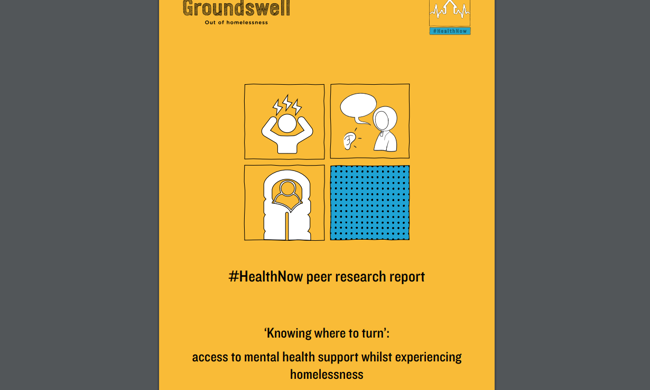#HealthNow peer research report ‘Knowing where to turn’: access to mental health support whilst experiencing homelessness
02.02.2023
Accessing mental health support while experiencing homelessness is challenging and complex. This qualitative, peer research, is based on interviews with 73 people experiencing homelessness and 7 stakeholders. The findings highlight the key difficulties people who are homeless face when experiencing poor mental health. The research was led by Groundswell, in partnership with Crisis and Shelter.
Key Findings:
- People experiencing homelessness face additional stigma concerning mental ill health. This leads to shame and embarrassment for many people who are unable to open up about the difficulties they were facing and reach out for help.
- Stigma can be perpetuated by interactions with healthcare professionals. Many people told us they felt judged when they did reach out for help. This was especially the case for people experiencing co-occurring mental health and substance use issues, who were more likely to face significant barriers to accessing the support that they needed.
- Many people cannot prioritise their mental ill health when they have more pressing immediate needs, such as securing accommodation. Lack of suitable accommodation exacerbates mental health issues, while simultaneously making it harder for people to prioritise accessing mental health support.
- People have a lack of trust in mental health services and mental health professionals. People told us about not being listened to, especially in relation to treatment options and diagnosis. People have greater trust in voluntary and community sector organisations and peers.
- Many people experiencing homelessness do not know where to go when they need mental health support. While some people told us they reached out to their GP, this often led to dissatisfaction.
- A significant proportion of people need support from a case or support worker to navigate the complexities of the system.
- Several people told us their only experiences of interacting with services were through primary care or emergency care. For some, despite ongoing mental ill health, a mental health crisis was the first time they were able to receive support.
- Support is often only available when a person’s mental health had significantly deteriorated.
- When people were able to access mental health services, they told us that transitions between different services and localities often meant they had to re tell their story, re-refer themselves or begin the process of accessing help entirely.
- Key suggestions participants identified that would improve the mental health and wellbeing for people experiencing homelessness included: access to safe, suitable and settled accommodation, earlier intervention and faster response from services, flexibility in service delivery and alternative types of support and, crucially, the involvement of peers.
Reference:
Groundswell. (2022) ‘Knowing where to turn’: access to mental health support whilst experiencing homelessness. London: Groundswell.

